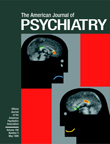To the Editor: We appreciate the comments made by Marlene P. Freeman, M.D., and hope that the following information is helpful. As noted in the abstract and article, we were studying valproate plus lithium in patients with refractory bipolar disorder who had failed to respond adequately to the prior intended 3-year crossover study comparing lithium, carbamazepine, and their combination. Of the six patients who responded to the addition of valproate, only one was on a regimen of valproate monotherapy (lithium was rejected because of weight gain), and the other five were treated with lithium plus valproate. With the patient receiving the combination in whom lithium was tapered off (also because of weight gain), this was done slowly, over a period of 54 days. Nonetheless, she then relapsed approximately 1 month after the lithium was discontinued, confirming the requirement of both drugs in this patient.
Overall, patients were compliant in taking their medication and achieved what most consider to be therapeutic blood levels of the drugs. The average serum levels of medication for the 13 who went through all four treatment phases were as follows: lithium phase=0.92 mmol/liter (SD=0.08); carbamazepine phase=7.64 mg/liter (SD=1.35); lithium plus carbamazepine phase=lithium, 0.92 mmol/liter (SD=0.16), carbamazepine, 7.70 mg/liter (SD=1.07); valproate plus lithium phase=valproate, 61.3 µg/ml (SD=19.9), lithium, 0.90 mmol/liter (SD=0.17); and lithium plus carbamazepine plus valproate phase (N=7)=lithium, 0.91 mmol/liter (SD=0.14), carbamazepine, 6.67 mg/liter (SD=1.78), valproate, 45.21 µg/ml (SD=15.79). As noted by Dr. Freeman, carbamazepine induces the metabolism of valproate. Thus, although a higher dose of valproate (1857 mg/day, SD=802) was administered when given concomitantly with carbamazepine than when given only with lithium (1680 mg/day, SD=793), lower valproate blood levels were still observed.
In the triple therapy phase, the most common side effects were dizziness, gastrointestinal symptoms, tremor, and sedation. These were avoided or ameliorated by slow titration or reduction of dose, and no patient dropped out of this phase because of side effects.
The study was not designed to address whether lower doses in combination were as effective as higher doses in monotherapy, but it is our general clinical impression that such combination regimens can be used in this fashion to avoid side effects instead of pushing monotherapy treatment to its maximum in order to achieve efficacy.
We hope this added information, most of which was excluded from the original manuscript because of space limitations, is helpful and clarifying.

